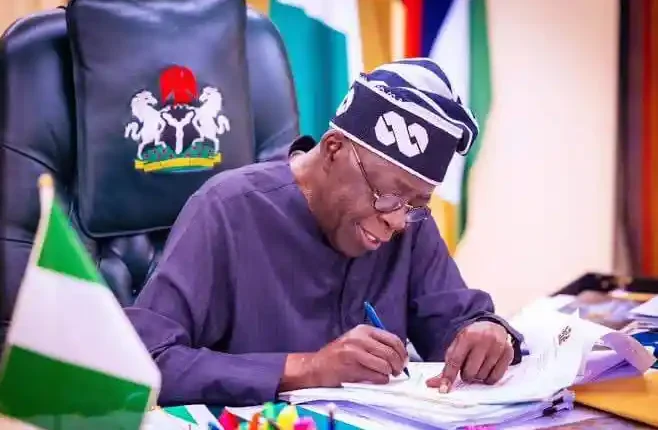Tinubu Bans Importation of Foreign Goods Available Locally as Nigeria First Policy Takes Off
- Advertisement -
In a decisive move to revamp Nigeria’s economy and prioritise domestic production, President Bola Ahmed Tinubu has launched the Renewed Hope Nigeria First Policy, a strategic economic framework that bars all Ministries, Departments and Agencies (MDAs) from procuring foreign-made goods or services that are available locally—without express waiver from the Bureau of Public Procurement (BPP).
This bold policy, approved during the Federal Executive Council (FEC) meeting held Monday at the Presidential Villa, Abuja, aims to boost local industry, reduce foreign dependency, and stimulate job creation.
Core Highlights of the Nigeria First Policy
- Advertisement -
The Nigeria First Policy mirrors aspects of the U.S. “America First” doctrine by Donald Trump but has been tailored for Nigeria’s unique economic structure. The key components include:
- MDAs barred from foreign procurements if local alternatives exist.
- Written waiver required from BPP for exceptions.
- Local content prioritised in all government contracts.
- Procurement officers redeployed to the BPP to reduce corruption.
- Mandatory technology transfer clauses in foreign contracts.
- Strict disciplinary measures for policy breaches.
- Creation of a national supplier database to support compliant procurement.
Minister: It’s Time to Build Nigeria’s Economy with Nigerian Goods
- Advertisement -
Addressing the press after the cabinet meeting, Minister of Information and National Orientation, Mohammed Idris, described the policy as “a bold shift in Nigeria’s economic direction.”
“This policy seeks to foster a new business culture that is bold, confident, and very Nigerian,” Idris said. “It aims at making government investment directly benefit our people and industries.”
He stressed that the Attorney General of the Federation has been instructed to draft an Executive Order to give the policy legal effect.
- Advertisement -
Enforcement Begins Immediately
Key enforcement actions approved by the FEC include:
- Revised procurement guidelines by the BPP to prioritise Nigerian products.
- Deployment of compliance mechanisms across MDAs.
- Mandatory policy alignment in procurement plans of all ministries.
- Cancellation of non-compliant contracts and disciplinary sanctions for violations.
According to the minister, the BPP will maintain a real-time database of certified Nigerian producers and service providers, which will be the only reference point for all public procurements moving forward.
Reviving Local Industries: Sugar Sector as Example
- Advertisement -
The Minister cited Nigeria’s sugar industry as an example of local capacity being undermined despite the presence of institutions like the Nigerian Sugar Council.
“We continue to import sugar despite the existence of local producers. This policy will change that,” he asserted.
He emphasised that contractors must now source from Nigerian producers rather than acting as intermediaries for foreign suppliers while local factories remain idle.
Implications for Nigeria’s Economic Strategy
The Nigeria First Policy comes amid Tinubu’s broader economic reforms, including:
- Fuel subsidy removal
- A unified foreign exchange regime
- Increased private sector engagement
- Targeted investor confidence restoration
The government believes the new policy will:
- Stimulate job creation
- Encourage industrial growth
- Support sustainable local development
Asian Infrastructure Investment Bank (AIIB) Membership Approved
Also at the meeting, Minister of Finance and Coordinating Minister of the Economy, Wale Edun, announced that FEC approved Nigeria’s membership in the Asian Infrastructure Investment Bank (AIIB) as a non-regional member.
Nigeria has now subscribed to 50 shares at $100,000 per share, amounting to $5 million, completing a process initiated in 2021.
Edun noted that the membership would grant Nigeria access to significant infrastructure development financing aimed at long-term economic transformation.
A New Chapter in Economic Nationalism?
President Tinubu’s Nigeria First Policy represents one of the most aggressive pushes toward economic nationalism in Nigeria’s modern history. By placing Nigerian goods and services at the center of public procurement, the administration is signaling a strong commitment to homegrown prosperity and economic sovereignty.
Though implementation challenges and resistance from entrenched interests may arise, the administration appears resolute.
“This is a major shift in government policy. It puts Nigeria—not foreign companies or imports—at the heart of our national development,” Minister Idris concluded.
The policy is set to take effect immediately upon the signing of the Executive Order by President Tinubu.
Additional reporting by Omajemite Don and Johnbosco Agbakwuru
- Advertisement -


